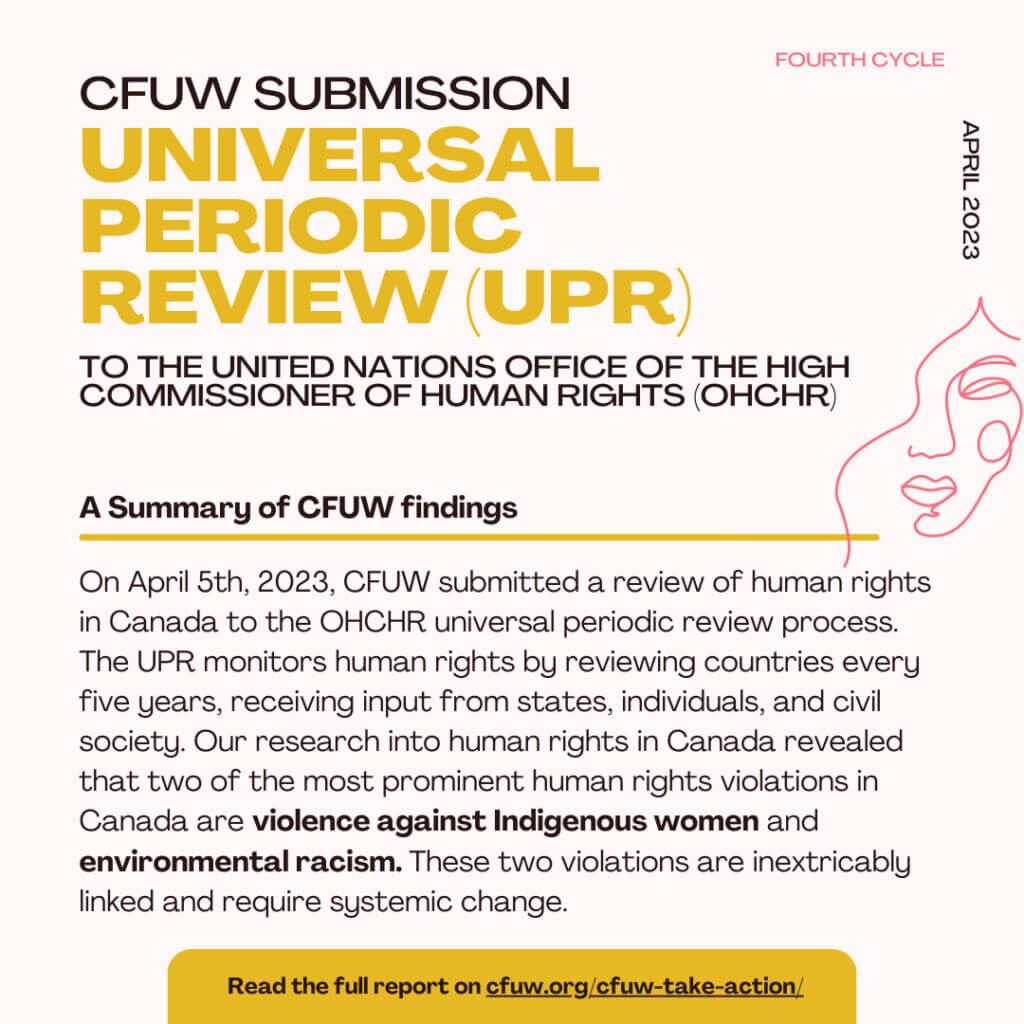CFUW Submission for Canada’s 4th Universal Periodic Review
 FOR IMMEDIATE RELEASE
FOR IMMEDIATE RELEASE
APRIL 28, 2023 – CFUW submission on the occasion of Canada’s 4th Universal Periodic Review to the United Nations (UN) Office of the High Commissioner of Human Rights (OHCHR)
Every five years, civil society actors, states, and human rights monitoring-bodies contribute a report to the OHCHR on Canada’s performance on securing human rights, as is its duty as a nation state. Amongst many issues within Canada, the most stark consistently are those facing Indigenous communities. CFUW’s report focused on two topics which are inextricably linked: violence against Indigenous women and environmental racism.
In terms of positionality and privilege – we acknowledge that our organization does not attempt to represent the views or realities of Indigenous Peoples. We aim to contribute to the effort of reconciliation and seek justice, alongside Indigenous communities, for the devastating impact of colonialism. We are committed to lifelong learning, and consistently becoming better allies.
Our report gives an overview of the state of violence against Indigenous women, the epidemic of intimate partner violence (IPV), compounding marginalizations, and intergenerational trauma. We also present the issue of environmental racism in many parts of Canada. The sheer volume of cases in which Indigenous communities are affected by a lack of regulation and oversight in natural resource projects, high incidences of pollution and environmental contamination, and long-term boil water advisories, in addition to violations of the UN Declaration on the Rights of Indigenous Peoples (UNDRIP) is unacceptable.
We issued the following recommendations:
- Pass and Implement Bill C-226: The National Strategy Respecting Environmental Racism and Environmental Justice Act and implement the national strategy with direct input from the affected communities and historically marginalized voices.
- Ensure the involvement of Indigenous communities in impact and environmental assessments of natural resource projects, with potential frameworks for Indigenous-led assessments to be normalized and funded.
- Continue to work with Indigenous nations to support agreements of self-governance and transfer the care of Indigenous children back to Indigenous communities.
- Ratify the right to a clean, healthy and sustainable environment – which was recognized by the UN Human Rights Commission in 2022 (HRC Resolution 48/13). This right would give more tools to Indigenous actors and the Canadian government to prevent and address environmental racism and injustice.
- Increase and mobilize funds for community-based, culturally appropriate mentorship and housing strategies for Indigenous women and youth, especially those involved in the criminal justice system, and aging out of care.
- Invest in Indigenous justice systems to prevent the ‘poverty-to-prison pipeline’ and the overrepresentation of Indigenous peoples, especially women and youth, in Canadian prisons.
- Treat MMIWG2S+ like the emergency it is and develop a “Red Dress Alert System” to amplify the message of missing Indigenous women and girls; in addition to increasing the transfer of federal funds for services for gender-based violence victims and survivors in Indigenous communities.
View the CFUW infographic about our UPR findings here.
Read the full CFUW report here.
About CFUW
CFUW is a self-funded, non-partisan organization of over 6,500 women and 95 clubs across Canada that works to improve the status of women by promoting human rights, public education, social justice and peace in Canada and abroad. CFUW is a member of the National Council of Women of Canada. CFUW also holds special consultative status with the United Nations “ECOSOC” and is a member of the Canadian Commission for UNESCO network. CFUW is the largest of the 61 affiliates of Graduate Women International (GWI) and is a member of the International Alliance of Women (IAW).